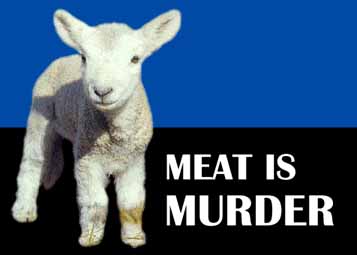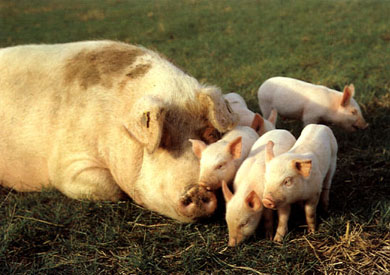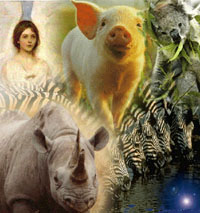
The Taste Of Depravity.

Most of the world's suffering is undergone by members of other species. A convergence of evidence suggests that the nature and relative extent of organic life's biological capacity to suffer is mediated by neuronal firing frequencies; cellular and synaptic density; and a distinctive neurochemical and functional architecture. Pain is not rooted in a capacity for a generative syntax."I wish no living thing to suffer pain."
Percy Bysshe Shelley (1792-1822)"As often as Herman had witnessed the slaughter of animals and fish, he always had the same thought: in their behaviour toward creatures, all men were Nazis"
Isaac Bashevis Singer
Humanity often behaves as though it were. For we presently keep hundreds of millions of other sentient beings in unimaginably frightful conditions. We do so for no better reason than to satisfy our culinary tastes. It has aptly been remarked that if animals had a conception of the Devil, he would surely have human form. Alas this is no mere rhetorical conceit. Humans deliberately incarcerate and butcher our fellow creatures in a vast state-sanctioned apparatus of concentration and extermination camps of incommunicable horror. In retrospect, our descendants may view them as a defining feature of our age in a way akin to our own conception of the Third Reich. Analogously, their sheer viciousness and even existence is usually camouflaged behind a mass of bland euphemism. Fortunately for our peace of mind, we find it hard properly to conceive of what we're being spared. Conditions inside the camps and factories are so gruesome that members of the public have to be barred from watching the atrocities which go on inside them.
For the most part, however, we are willing accomplices in our own ignorance. By our purchases we pay others to commit acts of extreme violence which might otherwise upset our squeamish sensibilities. Ironically, anybody who practises, or connives in, the maltreatment of a helpless and undeveloped infant of our own species is likely to be demonised and reviled. Ordinary decent people will find it "inconceivable" how such an "inhuman" monster could cause such suffering to the young, innocent and helpless. So (s)he will be prosecuted and locked up.
What we are doing in the death-factories is so vile that a few lines of text can scarcely even hint at its ghastliness. Nevertheless, we are so inured to the notion of exploiting and killing other sentient beings to titillate our palates that many otherwise "sophisticated" people will find the starkness of expression of these paragraphs somehow sensationalistic; or perhaps "emotive", as if the reality of such suffering could properly be otherwise.
Caring about the plight of the non-human victims of our actions is not a case of sentimental bunny-hugging nor of child-like anthropomorphism. Nor is it a matter of caring more about animals than humans; nor even, as is sometimes suggested with all appearance of seriousness, outright misanthropy. "Tender-minded" people who worry about the torture of non-humans are on balance temperamentally more rather than less inclined to act in an effort to minimise human suffering too. Such contrasts and false antitheses are in any case unhelpful. Simply in abstaining from eating meat, for instance, one can still spend just as much time campaigning for exclusively human causes as one did as a practising carnivore.
There is one real glimmer of hope amid the mechanised carnage. Within the next hundred years or so, and possibly sooner, biotechnology will enable the human species cost-effectively to mass-produce edible cellular protein, and indeed all forms of food, of a flavour and texture indistinguishable from, or tastier than, the sanitised animal products we now eat. As our palates become satisfied by other means, the moral arguments for animal rights will start to seem overwhelmingly compelling. The Western(ised) planetary elite will finally start to award the sentient fellow creatures we torture and kill a moral status akin to human infants and toddlers. Veganism, though not in quite the contemporary sense, will become the global norm. Thanks to genetic engineering, the huge reduction in gratuitous suffering promoted here is likely to take place even if none of the other predictions of HI are borne out. If they are, then the humblest snack will taste more delicious than the ambrosial food of the gods. Today's gourmets might as well be feeding on greasy chips.
Much more seriously, in those traditional eco-systems that we chose to retain, millions of non-human animals will continue periodically to starve, die horribly of thirst and disease, or even get eaten alive. This is commonly viewed as "natural" and hence basically OK. It would indeed be comforting to think that in some sense this ongoing animal holocaust doesn't matter too much. We often find it convenient to act as though the capacity to suffer were somehow inseparably bound up with linguistic ability or ratiocinative prowess. Yet there is absolutely no evidence that this is the case, and a great deal that it isn't.
The functional regions of the brain which subserve physical agony, the "pain centres", and the mainly limbic substrates of emotion, appear in phylogenetic terms to be remarkably constant in the vertebrate line. Not merely is the biochemistry of suffering disturbingly similar where not effectively type-identical across a wide spectrum of vertebrate (and even some invertebrate) species. It is at least possible that members of any species whose members have more pain cells exhibiting greater synaptic density than humans sometimes suffer more atrociously than we do, whatever their notional "intelligence". As a (technically, an ethical negative; see below) utilitarian, I would have to say, counter-intuitively, that were this to be the case they would intrinsically matter, and would themselves find things intrinsically mattering, more than we do. This sounds extravagantly overstated. Yet it is just the yardstick by which we should be reckoned to matter more than our phenomenologically impoverished silicon etc. intellectual mentors centuries hence. One must just hope the disquieting notion that anything, anywhere, can suffer more than humans do is ill-conceived.
1.10 On The Misguided Romanticisation of Feline Psychopaths.
In future, anyhow, the life-forms which exist on the planet will be there purely because we allow them to do so, or choose to create them. This smacks of hubris; it is also true. Increasingly, we are able to configure the matter and energy of the world in any way we so desire consistent with the laws of physics. So the moral and practical question arises: what other organisms, and therefore what other modes of experience, are we going either to create or retain "in the wild" outside the gene-banks and computer software libraries in millennia to come?
One may suspect that most people could bear the possible loss of a few hundred thousand species of beetle with relative equanimity. Familiar if eugenically-enhanced herbivores, on the other hand, can be allowed to graze securely within the confines of a well-regulated natural habitat. They will best be treated with long-acting depot contraceptives to stop uncontrolled breeding. Their happiness should prove easier to engineer genetically than is possible in humans. This is on the assumption non-humans are less intellectually fastidious in their pleasures than are, on occasion, some members of our own kind.
Yet what about the carnivorous species? It is easy to romanticise, say, tigers or lions and cats, and admire their magnificent beauty, strength and agility. But we would regard their notional human counterparts as wanton psychopaths of the worst kind. So just as there is no need to recreate the natural habitat of smart, blond, handsome etc. Nazi storm-troopers who can then prey on their natural victims (and Nazis are no less naturally a strikingly noteworthy pattern of matter and energy thrown up in the course of evolution, albeit of a type now fortunately extinct), likewise the practice of continuing to breed pre-programmed feline killing machines in homage to Nature is ethically untenable too. It is not, needless to say, the fault of cats that they are prone to torture mice; but then, given the equations of physics, it isn't the fault of Nazis they try to persecute Jews. This is no reason to let them continue to do so.
In a triumph of aestheticism over morality, many animal lovers otherwise sympathetic to the sentiments expressed here will doubtless be aghast at the very idea of losing such lovable companions and time-honoured killers as members of the cat family; but then they are unlikely to be hunted down in terror or physically eaten alive, which lends a rather different perspective to any issue at all.

1.11 The Last Twisted Molecule On Earth?
This meditation on the plight of our fellow species leads to one of the few precise, and potentially falsifiable, predictions to be hazarded here about the next couple of thousand years. At some momentous and exactly datable time, I would surmise well before the end of the fourth millennium and possibly even the third, the last unpleasant experience ever to occur on this planet will take place, possibly a (purely comparatively) minor pain in some (to us) obscure marine invertebrate.For just as the smallpox virus was systematically hunted down to extinction, so the precise molecular signature(s) of aversive experience and its predisposing genes can predictably be hunted down and wiped out as well. The systematic application of nanotechnology, self-reproducing micro- miniaturised robots armed with supercomputer processing power, and ultra-sophisticated genetic engineering, perhaps using retro-viral vectors, will assure the eradication of the root of all evil in its naturalistic guise.
It might be supposed that pain and unhappiness take such myriad forms that an impossibly large hotchpotch of biochemical reactions will have to be eliminated before the emancipatory project can be complete. The difficulty, and more controversially the impossibility, of establishing non-trivial type-type identities between physical and higher mental states would seem only to make the problem worse. In one respect at least, however, the many faces of misery are deceptive. Like the various nominal sources of happiness, they foster a genetically adaptive illusion born of the way the basic neural processes which mediate emotion physically infiltrate and infuse the neo-cortex. Millions of years of DNA-driven encephalisation of emotion have obscured its primitive substrates. In striking at the ancient limbic motors of despair, neural re-engineering should induce their legion of cognitive hangers-on to dissipate too. First in humans and, progressing "down" the phylogenetic tree, eventually in every non-human metazoan as well, all of the incomprehensibly disparate modes of experience undergone should share the property of being, at the very least, generically delightful. And a uniquely vile era in the history of the world will have drawn to a close.
E-mail Dave : dave@hedweb.com







